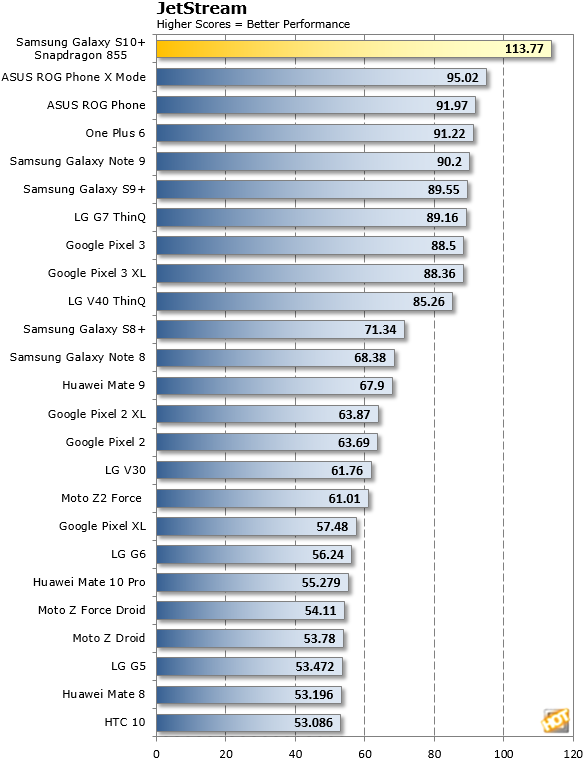For our firsts set of tests, we're using the JetStream
benchmark for Javascript
performance and RightWare’s Web Test 3.0 for comprehensive, mixed-media web performance analysis, including HTML5
rendering. Here we'll primarily determine how the Samsung Galaxy S10+, with its 8GB of RAM and Snapdragon 855 SoC handles this workload with the Chrome web browser. All tests were performed at the phone's default FHD+ 2280x1080 screen resolution.
 |
|
JetStream And Basemark Web 3.0 |
| JavaScript and Browser Testing |
|


Qualcomm's Snapdragon 855 Mobile Platform on board the Galaxy S10+ offers the best performance by a wide margin here versus any other Android device we've tested to date. These are sizable performance gains and we'll note the device feels very snappy when web browsing in general.
 |
|
GeekBench |
|
Synthetic CPU Benchmark |
|
In the GeekBench test, we're stressing only CPU cores in a handset (not graphics), with both single and multi-threaded workloads. The test is comprised of encryption processing, image compression, HTML5 parsing, physics calculations, and other general purpose compute processing.

In GeekBench we were able to pull in Apple's iPhone XS Max as well, since it's a cross-platform test. As you can see, the
Snapdragon 855 CPU on board our Galaxy S10+ doesn't quite catch Apple's latest silicon, but it's very close in multi-threaded workloads, though still well behind in single-threaded performance. On the other hand,
Qualcomm delivered a massive increase in single-threaded IPC, to the tune of nearly 40% over its previous generation
Snapdragon 845, according to Geekbench anyway.
 |
|
Futuremark PCMark For Android |
|
General Purpose Pocket Computing Performance Metrics |
|
Futuremark's PCMark for Android is an excellent suite of tests that we recommend for benchmarking performance of a handset in a wide range of tasks, for things like image and video editing, as well as lighter-duty workloads like email and web browsing. When you see the test running live it's clear the scripted application tests are carefully selected and tuned to make use of the platforms involved in a very controlled way.
The Samsung Galaxy S10+ pulls out another top slot victory here, though by a slimmer margin versus the rest of the field. In general, any of the top group of devices here will handle these standard use case scenarios relatively well.
 |
|
AnTuTu 7 |
|
Platform Benchmarks |
|
AnTuTu’s latest benchmark returns a number of metrics ranked with somewhat nebulous scores, rather than frame rates or time to complete. We tested with the latest version of AnTuTu across an all Android platform group. AnTuTu returns four top level performance metric results that we are including here: CPU, RAM, 3D, UX (or User Experience), along with a total score.
AnTuTu ranks the Samsung Galaxy S10+ way out in front of our fastest previous generation Snapdragon 845 phone, the ASUS ROG Phone in its performance-tuned X mode. Here we see roughly a 20% advantage overall for the new Samsung Galaxy S10+ and its Snapdragon 855 power plant, with most notable gains in the GPU and CPU tests.
AnTuTu’s latest benchmark returns a number of metrics ranked with nebulous scores, rather than frame rates or time to complete. We tested with the latest version of AnTuTu across all platforms including Android, iOS and even Windows Phone. AnTuTu returns four top level performance metric results that we are including here: CPU, RAM, 3D, UX (or User Experience), along with a total score.
















